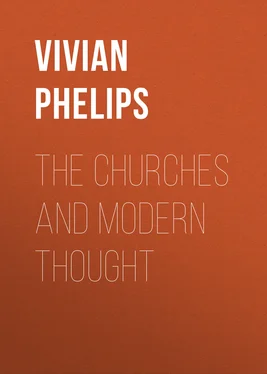Vivian Phelips - The Churches and Modern Thought
Здесь есть возможность читать онлайн «Vivian Phelips - The Churches and Modern Thought» — ознакомительный отрывок электронной книги совершенно бесплатно, а после прочтения отрывка купить полную версию. В некоторых случаях можно слушать аудио, скачать через торрент в формате fb2 и присутствует краткое содержание. Жанр: foreign_prose, foreign_religion, Философия, foreign_antique, на английском языке. Описание произведения, (предисловие) а так же отзывы посетителей доступны на портале библиотеки ЛибКат.
- Название:The Churches and Modern Thought
- Автор:
- Жанр:
- Год:неизвестен
- ISBN:нет данных
- Рейтинг книги:4 / 5. Голосов: 1
-
Избранное:Добавить в избранное
- Отзывы:
-
Ваша оценка:
- 80
- 1
- 2
- 3
- 4
- 5
The Churches and Modern Thought: краткое содержание, описание и аннотация
Предлагаем к чтению аннотацию, описание, краткое содержание или предисловие (зависит от того, что написал сам автор книги «The Churches and Modern Thought»). Если вы не нашли необходимую информацию о книге — напишите в комментариях, мы постараемся отыскать её.
The Churches and Modern Thought — читать онлайн ознакомительный отрывок
Ниже представлен текст книги, разбитый по страницам. Система сохранения места последней прочитанной страницы, позволяет с удобством читать онлайн бесплатно книгу «The Churches and Modern Thought», без необходимости каждый раз заново искать на чём Вы остановились. Поставьте закладку, и сможете в любой момент перейти на страницу, на которой закончили чтение.
Интервал:
Закладка:
It may be urged that we have, what is of far more importance, the picture of His character. Have we? The absolute sinlessness of Christ is one of the chief proofs held out to us of His divinity. It is described as being in itself a miracle so great that it furnishes us with sufficient grounds for belief in other miracles. Many pious and learned theists feel that the character of Christ as portrayed in the Gospels betrays imperfections. But let this pass. What do we know of His life? Let us assume that in the Gospel of St. Mark we are put in possession of the impressions of an eye-witness. St. Peter’s personal knowledge of the private life of Jesus was confined to his recollections concerning a beloved Master during the period of His public ministry. And that ministry extended over one year, or at most three years. Have not the disciples of great teachers in the past invariably extolled the perfections of their masters? Have they ever dwelt upon their imperfections? Has not the picture handed down by tradition, and afterwards committed to writing, often been that of a perfect man? That the writers of the Gospels recognised the need for Christ to appear sinless, and adopted questionable methods for their purpose, is only too evident. Dr. Robinson explains 84 84 In note A, pp. 42–3, of his book, The Study of the Gospels .
the disappearance from the other Gospels of St. Mark’s references to “anger,” “grief,” “groaning,” “vehemence,” etc., as being “the result of a kind of reverence which belonged to a slightly later stage of reflection, when certain traits might even seem derogatory to the dignity of the sacred character.” Comment is superfluous.
There is another difficulty of belief in the divinity of Christ, which it is all the more essential to bring into prominence because it usually receives but scant notice from the pulpit. I refer to the “ignorance” of Jesus Christ. In a review of Le Réalisme Chrétien et l’Idéalisme Grec
Конец ознакомительного фрагмента.
Текст предоставлен ООО «ЛитРес».
Прочитайте эту книгу целиком, купив полную легальную версию на ЛитРес.
Безопасно оплатить книгу можно банковской картой Visa, MasterCard, Maestro, со счета мобильного телефона, с платежного терминала, в салоне МТС или Связной, через PayPal, WebMoney, Яндекс.Деньги, QIWI Кошелек, бонусными картами или другим удобным Вам способом.
1
In the June (1906) number of Review of Theology and Philosophy , edited by Professor Allan Menzies, D.D.
2
As the Rev. John A. Hutton attempts to show in the Hibbert Journal , July, 1905.
3
In his address at the London Diocesan Conference in April, 1904.
4
When addressing a conference of clergy and church-workers at Blandford on September 7th, 1905.
5
In the course of one of those remarkable orations of his which always command the thoughtful attention of the House. The speech was reported in the newspapers of March 15th, 1904.
6
See Dr. Horton’s letter to the Daily News , August 23rd, 1905.
7
The Rev. Charles Voysey, in a sermon preached at the Theistic Church, Swallow Street, on February 5th, 1905.
8
See pp. 63–4.
9
Quoted from What it is to be a Christian , a pamphlet written by the Ven. J. M. Wilson, D.D.
10
Eighteen per cent. was the figure given by Bishop Ingram, speaking of “Londoners,” in his speech at the annual meeting of the Bishop of London’s Fund in 1904; but, according to the strict results of the census, the figure for London is twenty-two or twenty-three per cent. of the total population.
11
As Mr. Fielding remarks in his book, The Hearts of Men (pp. 217–8): “To one coming to Europe after years in the East and visiting churches, nothing is more striking than the enormous preponderance of women there. It is immaterial whether the church be in England or France, whether it be Anglican or Roman Catholic or Dissenter. The result is always the same—women outnumber the men as two to one, as three to one, sometimes as ten to one.”
12
As a matter of fact, no distinguished leader among modern biologists has come to any such conclusion. People are apt to forget that, while Lord Kelvin is undoubtedly one of the most distinguished living physicists, he is not himself a biologist.
13
See Nature , April 23rd, 1903; also Appendix to this work.
14
This assertion is severely criticised by Mr. Joseph McCabe in the Hibbert for July, 1905. Mr. McCabe holds that “Sir Oliver Lodge’s own conception of life may, with a far greater show of reason, be described as a modified survival of an older doctrine” (p. 746).
15
Dr. Alfred Russel Wallace, the distinguished naturalist and evolutionist, is another scientist with spiritist convictions, and his concern for supernatural religion led him to step outside his own domain and make that remarkable attack upon current scientific opinions in astronomical matters which met with such unanimous condemnation (see the Fortnightly Review for March and September, 1903).
16
In the Times , October, 1904.
17
At Exeter Hall, in March, 1905, Lady Blount developed her “flat-earth” theory, and accused Newton of want of logic.
18
A book, edited by the Rev. J. E. Hand (George Allen), which gives, perhaps, the best that can be said by able and fair-minded men, writing in the light of the latest knowledge and criticism, in favour of a reconciliation between religion and science. The book contains essays by various authors—Sir O. Lodge, Professors Thomson, Geddes, and Muirhead, the Rev. P. N. Waggett, the Rev. John Kelman, and others.
19
Dr. W. Barry, in his Ernest Renan , is content to attribute the change mainly to Renan’s study of Kant. But such a theory is inconsistent with Renan’s own statement in his Reminiscences , where he expressly declares that questions of history, not metaphysics, shook his faith.
20
Author of a vituperative libel on agnostics, called Atheism and Faith .
21
The psychical aspect of the belief of such persons is discussed in Chap. VI., § 5.
22
Canon Scott Holland, in a sermon preached in St. Paul’s Cathedral on the first Sunday after Epiphany, 1905. See also Appendix.
23
The Secretary of the Rationalist Press Association has received several private letters from clergymen expressing their desire to leave the Church if they could find some employment. They usually have large families dependent upon them for support.
24
I omit all mention of the trading or domestic classes who often depend directly for their support on strict religionists. The way in which “their bread is buttered” is bound to enter considerably into their calculations, and also they have often even less leisure for the study of modern thought than a steady (temperate) working man.
Читать дальшеИнтервал:
Закладка:
Похожие книги на «The Churches and Modern Thought»
Представляем Вашему вниманию похожие книги на «The Churches and Modern Thought» списком для выбора. Мы отобрали схожую по названию и смыслу литературу в надежде предоставить читателям больше вариантов отыскать новые, интересные, ещё непрочитанные произведения.
Обсуждение, отзывы о книге «The Churches and Modern Thought» и просто собственные мнения читателей. Оставьте ваши комментарии, напишите, что Вы думаете о произведении, его смысле или главных героях. Укажите что конкретно понравилось, а что нет, и почему Вы так считаете.












